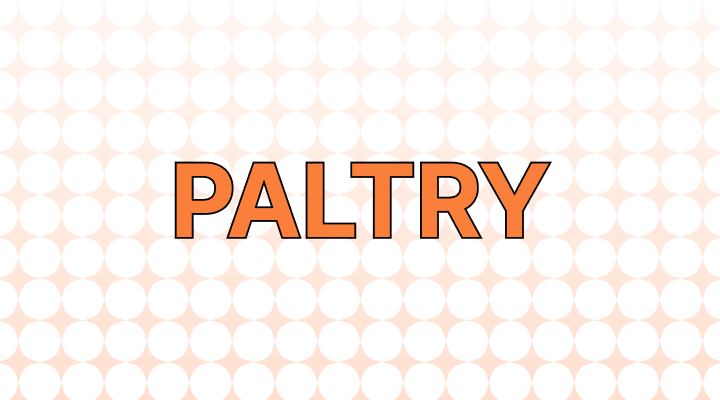Although not a commonly used word, "paltry" means trivial, inferior, or meager. The term is often used to emphasize the lack of worth or quality of something, suggesting that it is inadequate or small in comparison to what is expected or desired.
"Paltry" is commonly used to describe a small or trivial amount of money that is insufficient like a paltry salary or paltry donation. When referring to quality, it can be used to describe objects of inferior quality like paltry motel rooms that are not great accommodations. However, "paltry" does not always have to describe physical objects; a paltry excuse would be a trivial reason.
"Paltry" is not to be confused with "poultry," "pantry," or "portly." Although the words may look similar at first glance, they have completely different meanings.
- paltry: trivial, inferior, or meager
- poultry: domesticated birds raised for their meat and eggs such as chickens and turkey
- pantry: a storage area, often in a kitchen, used to store food and other supplies
- portly: describes someone who is stout, overweight, or has a round and full figure
Example sentences
- Despite years of hard work, he received only a paltry raise at his job.
- The company's attempt to fix the issue was met with a paltry response from customers.
- The restaurant's portion sizes were disappointingly paltry for the price.
- She scoffed at the paltry excuses he offered for missing the important meeting.
- The settlement amount offered was a paltry sum compared to the damages incurred.
- Despite their paltry efforts, they managed to complete the project just in time.
- The paltry turnout at the event left the organizers disappointed.
- The book's paltry sales figures led to its discontinuation.
- The restaurant received paltry reviews for its lackluster service and mediocre food.
- The singer's attempt at a comeback was met with a paltry response from fans.
Want to sound like a native speaker?
Engram’s AI-powered grammar checker makes your English sound like a native speaker’s, suggesting natural English expressions on top of fixing grammar, spelling, punctuation, word order, and vocabulary.

Reference:
















